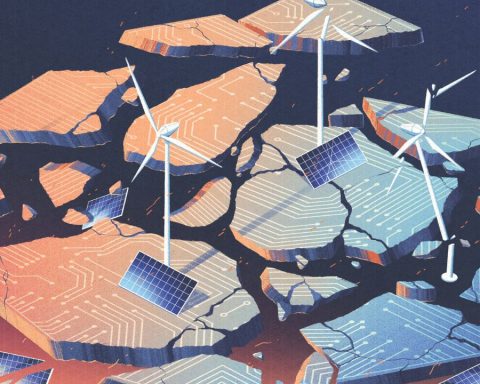A global charging network grows, plugged and unplugged.
In 2020, the number of publicly available charging stations for electric cars in China far outnumbered those in other countries, but that could change soon. In early September, oil company Shell announced it plans to build 50,000 on-street charging stations in the U.K. over the next four years. And in October, governors from five different states (and different political parties) agreed to build a network of charging stations throughout the American Midwest. Michigan Governor Gretchen Whitmer has also unveiled plans to install the country’s first stretch of wireless charging roads. The inductive technology doesn’t require drivers to stop at a charging station, since it recharges your batteries as you ride.
Shipping goes green.
Now that electric cars are primed to take over the highways, what’s next? This summer, Denmark’s A.P. Moller-Maersk, the world’s largest shipping firm, announced it would spend US$1.4 billion on eight new vessels that can run on “carbon neutral” methanol instead of the dirty “bunker fuel” used by container ships. Maersk’s head of decarbonization, Morten Bo Christiansen, said in a video message, “Once they are all out there sailing on green methanol, they will save a million tons of CO2 every year.” Of course, securing green methanol is the next challenge. So far, the company has commissioned enough e-methanol (to be made using renewable energy and carbon dioxide captured from agricultural waste) to run one prototype ship, but it plans to have all ships carbon-neutral by 2030.
Look to the skies.
Global courier company DHL Express has ordered 12 fully electric cargo planes. The supplier is Seattle-based Eviation, whose “Alice” line of commuter planes should soon become the world’s first commercially produced electric aircraft. Eviation, formed by a group of airplane aficionados from Israel, the U.S. and Canada, says the Alice cargo jet, flown by a single pilot, will carry loads weighing up to 1,200 kilograms, with a maximum range of 800 kilometres. Eviation expects to begin deliveries to DHL in 2024, hoping to kick off “a new era with electric aircraft.”
IKEA ramps up its clean energy business.
Solar panels produced almost a 10th of the EU’s electricity in June and July, and IKEA wants to sell some of that power. The retail giant already sells solar panels in 10 other countries, but as of September, it began selling renewable energy (similar to the way an electric utility would) to customers in its home market of Sweden. The power, generated by certified wind and solar parks, comes from Nord Pool, Europe’s leading power market. Homeowners manage their energy use with an app. Those with their own solar generating systems can also track their energy production, and surplus power can be sold back to the grid. IKEA Sweden’s head of sustainability says the retailer hopes to offer energy platforms – including the solar panels – in all of its markets by 2025.
Ich bin ein vegetarian.
Accounting for 15% of the world’s greenhouse gas emissions, the meat and dairy sector is overdue for disruption. The latest blow comes from Berlin university students, who petitioned their schools to offer more sustainable meals. Now, four universities that run 34 cafeterias across Berlin have announced they are cutting back meat dishes by 96%. Starting in October, the dining halls offer 68% vegan options, 28% vegetarian options and 2% fish options. They will offer a single meat option four days per week.
Beyond everything.
In less than 10 years, Los Angeles–based Beyond Meat has grown into a US$500-million-a-year giant selling plant-based alternatives to chicken, beef and pork. But what matters most is where the firm is headed next. Beyond has filed 108 trademark applications for the next generation of low-carbon protein products, including Beyond Crab, Beyond Shrimp, Beyond Eggs, Beyond Milk and even Beyond Jerky. Silicon Valley–based CB Insights reports that by mid-2021, investors in plant-based products had already poured more than US$1 billion into alternative protein companies, three times as much as was invested in all of 2020. Maybe one will finally crack the elusive plant-based filet mignon market.





